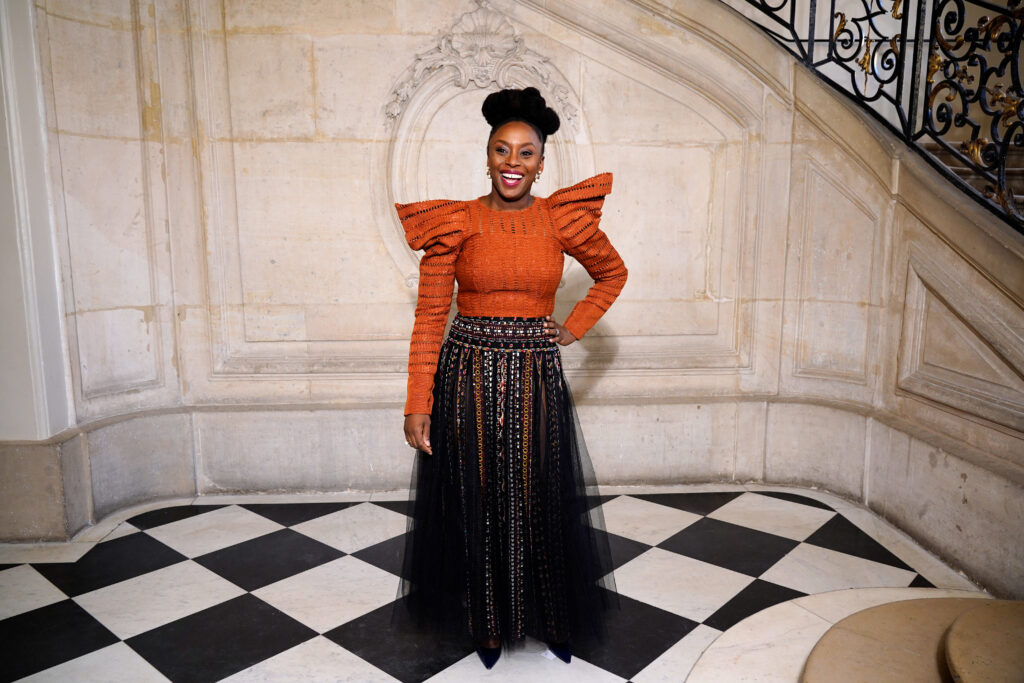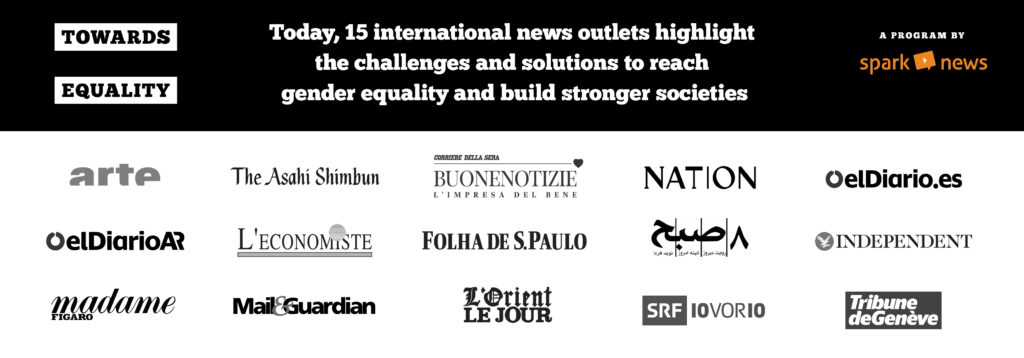Melinda Gates arrives at Elysee Palace for the Generation Equality Forum hosted by French President Emmanuel Macron on July 01, 2021 in Paris, France. The Generation Equality Forum is a global gathering for gender equality convened by UN Women and co-hosted by the governments of Mexico and France, in partnership with youth and civil society. (Photo by Aurelien Meunier/Getty Images)
They had been watching each other from afar for a while. They would have preferred to meet each other “in real life”, but their enthusiasm was not spoiled by the constraints that the times still impose. That afternoon in June, on the sidelines of the Generation Equality Forum — which brought together in Paris, under the aegis of UN Women, the political, economic and associative worlds around the defence of women’s rights and freedoms — they were happy to finally talk, even through a screen. Melinda French Gates in Paris and Chimamanda Ngozi Adichie in Lagos were able to share their mutual admiration, their analyses of a complex era and their concerns. Next time, it’s a promise, they will meet face to face in the same room.
Madame Figaro: Chimamanda Ngozi Adichie, even before your daughter was born, you wrote *Dear Ijeawele, or a Feminist Manifesto in 15 Suggestions. She is now five years old. Is it an easier text to write than to implement?
Adichie: When my daughter was born, I had real ambitions for the way I raised her, all while trying to avoid being the famous “crazy feminist mother”. I didn’t want her to have dolls, for example, simply because as a child I had dolls, but my brothers had Legos and puzzles, and I’m convinced that I can’t do anything with my hands today because of that. But, of course, she went to nursery school, loved dolls and had them. So I started to fill her head with the idea that dolls — like princesses — were of little interest. I said: “Princesses are very beautiful but also very boring, because they have nothing to do but sit around and look pretty. And what do we like? We like superheroes.” So far, I feel like she’s validating my point.
Melinda French Gates: You’ve been much more determined than I have. When I think back to that time — my eldest daughter is now 25 — I remember one of my mistakes. When she was little, I was already very involved in global health issues. One day, in the living room, she said to one of her dolls: “Lie down, you have Aids, I’ll cure you.” It shows how too much space we can give to our own fights at home. Today, she has become a doctor. Maybe it wasn’t so bad after all … But at the time I felt very guilty.
Later, did you talk to her about feminism?
Gates: Not really, no. But she saw me working, she even made me pay for it at one time, because she considered that I didn’t need it financially. Which was true. And then, as she got older, she thanked me for showing her the way!
Adichie: What about your son, did you talk to him about it? I’m very curious about the education given to a boy. In an ideal world, I’d like to have one, but I don’t think that’s possible …
Gates: I talked to him a lot. I wanted to hear what he and his friends thought about it. We have a duty to make boys aware of these issues because, even if progress is being made on equality issues, it is not immediately that they will no longer be in the driver’s seat among the decision-makers, the finance ministers, the prime ministers, the presidents of tomorrow … As for my youngest daughter of 18, the question of her feminism does not arise, it is there.
Do you feel that this generation is more committed, more militant than yours?
Adichie: I have the feeling that the younger generations — those who are just leaving their teens or entering their twenties — are much less apologetic about being feminists, that’s a given. Yet, from time to time, in Nigeria, I am surprised to see how conservative pockets remain even among educated, cultured, privileged couples who go on holiday to Europe or America, who both work … Even within these groups, the idea that the wife should go home to prepare dinner for her husband is still widespread.
Gates: In the United States too, there is still a lot of progress to be made, and in particular to impose more pressure and action in certain industries, such as technology, where women are under-represented and not at all welcome. Yet it is tech that is changing the world. There is a real bro culture, and the media has a share of the responsibility. We also need shows with more powerful women and with more men who do the housework, otherwise Chimamanda is right, nothing will change.
Adichie: That’s why I avoid watching television in Nigeria, otherwise I get angry. Often people say to me, “Look, there is a great series on Netflix about a female heroine, you will love it.” I look, indeed this heroine does great things in her job, but she also has something strange, every time. It could be a mental illness, it could be social instability or it could be that she can’t manage her career without blowing up her family life. I think we should also show normal women who do great things, who are in tech, finance, can become a detective and have a husband, an ordinary life … It’s very important because, otherwise, the message we send to young girls and boys is the following: women who achieve a certain level of professional success do so because they are abnormal. This is not true.
 Chimamanda Ngozi Adichie attends the Dior Haute Couture Spring/Summer 2020 show as part of Paris Fashion Week on January 20, 2020 in Paris, France. (Photo by Francois Durand/Getty Images for Dior)
Chimamanda Ngozi Adichie attends the Dior Haute Couture Spring/Summer 2020 show as part of Paris Fashion Week on January 20, 2020 in Paris, France. (Photo by Francois Durand/Getty Images for Dior)
We need role models, but accessible role models. What were yours?
Adichie: I lost my mother two months ago, it’s still quite painful, but I’ll tell you without a doubt: my mother. She would never have called herself a feminist, we didn’t use that word in her world. But she said what she thought, which is no small feat. She was the first female head of the faculty office in Nsukka, Nigeria, and I can still hear her saying, “Tomorrow I’m interviewing three people, and there’s one young woman I’d like to give a chance to.” It was essential for me as a teenager, she showed me that once you had made it through the door as a woman, you must open the door for others to enter.
Gates: I also answer “my mother”, without any hesitation. When I didn’t trust myself, when I was insecure, she was there, no matter what. More recently, another role model for me has been Angela Merkel. This woman has been underestimated all her life. She is a great physicist, and the way she has led Europe for so many years is impressive.
Is Kamala Harris also a role model for you in politics?
Gates: I was so happy when she was appointed. She has real positions, she knows how to use her power of influence, and she is an incredible role model for women everywhere in the United States. We have discussed the issue of strong mothers, and here is one
who talks about it very openly.
Adichie: On this question of role models, I would like to say that I do not believe in the “purity” of beings, I do not expect public figures to be pure. In life, I tell stories, and the fundamental element in telling stories is that human beings have faults. Perfection is not only unrealistic, but also extremely boring. I’ve been asked about Kamala Harris or other politicians, “What do you think of the position she took on this issue when she was in California?” As if all our positions at any point in our lives should be exemplary … It drives me crazy. To me, she is an extremely moral, intelligent, hard-working person, because she knows she has more to prove just because she is a woman.
Women have been more affected than men by the consequences of the Covid pandemic. Are you worried about them?
Gates: Extremely. They have lost 13-million more jobs worldwide than in 2019. In countries where vaccination is effective, men’s jobs are coming back faster than those of women. Not to mention contraception: 12-million women did not have access to contraception during this period. Imagine the population of London and Paris suffering unwanted pregnancies in these proportions, women condemned to poverty, not knowing how they will feed their children. It’s a vicious circle.
Was the Generation Equality Forum in Paris a key marker?
Gates: Yes, I hope so. We need concrete commitments on gender equality, but we have waited 26 years since the Fourth World Conference on Women in Beijing (September 1995). A generation. In this area, there is a lot of talk, but little action. And here in Paris, those who work on these issues, notably NGOs and foundations, found themselves with decision-makers from all over the world and obtained funding from them.
Do these commitments seem serious to you?
Gates: The States have realised that greater equality brings human and economic benefits. And only this awareness can make things happen.
Chimamanda Ngozi Adichie, does literature have a role to play in making women more visible?
Adichie: Honestly, I don’t know, but I’m trying. I recently spent a lot of time in my hometown [Aba] — first because I buried my father there, then my mother — and I was struck by the number of families that are carried by women, in every way, but who don’t recognise it. Sometimes they even say to you, “My husband bought us this house”, when it’s not true. There is a kind of cultural heritage that makes them protect their husband’s pride and ego. I talked to many of them and it made me want to write about life as it is rather than as we wish or believe it to be. Culture, literature and people working in these fields have an opportunity and the power to act.
Dear Ijeawele, or a Feminist Manifesto in 15 Suggestions is the story for which Chimamanda Ngozi Adichie received the Grand Prix de l’Héroïne-Madame Figaro in 2017.
This article is being published as part of “Towards Equality”, an international and collaborative initiative gathering 15 international news outlets to highlight the challenges and solutions to reach gender equality. The Mail & Guardian is proud to be among them.

